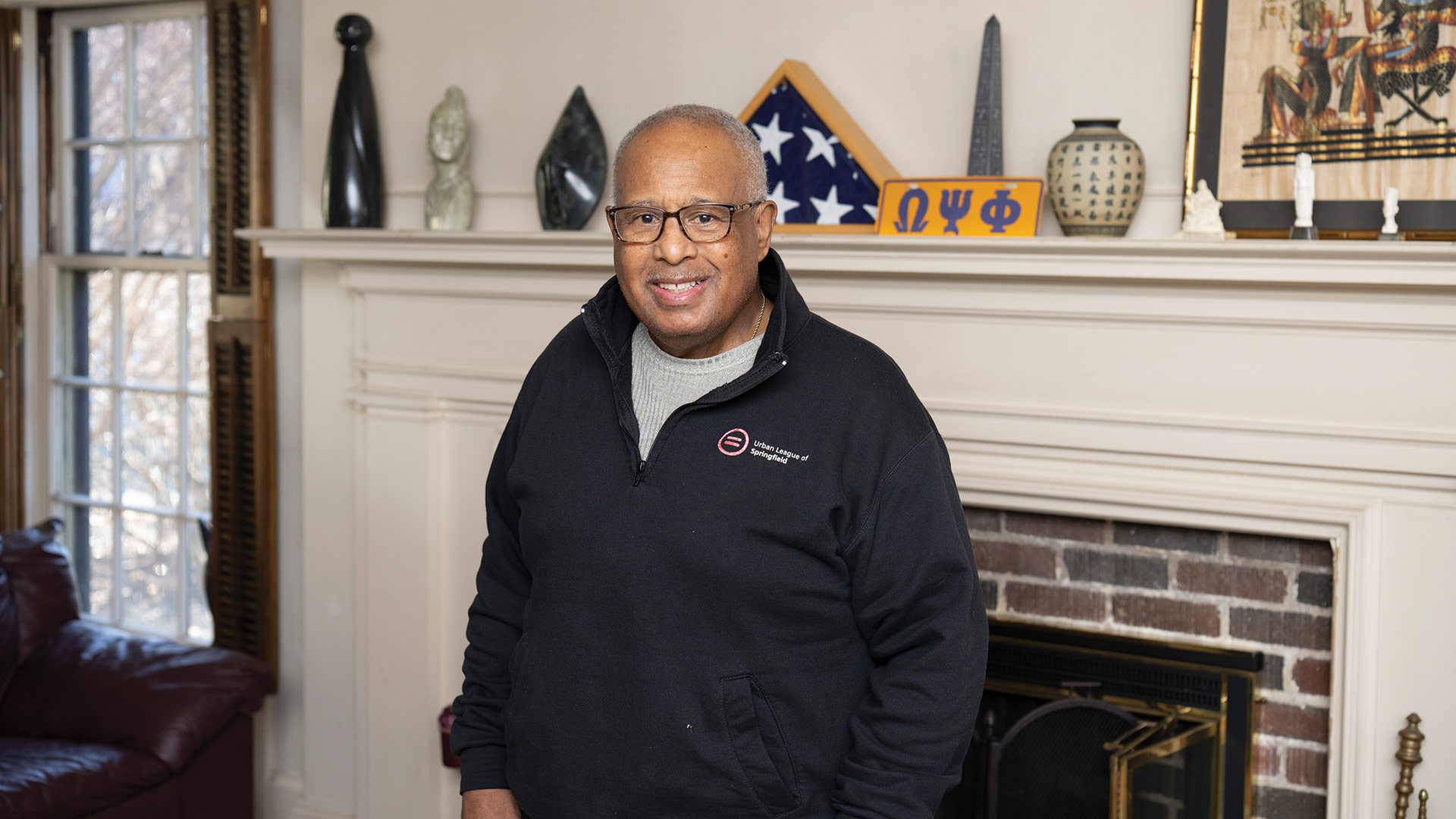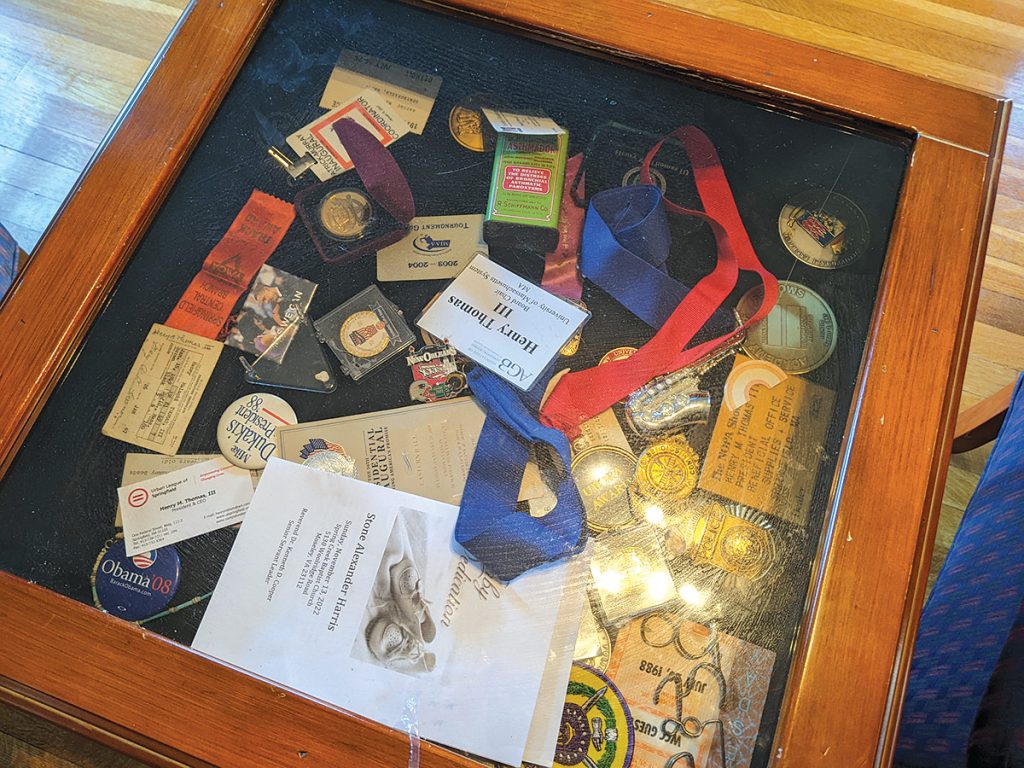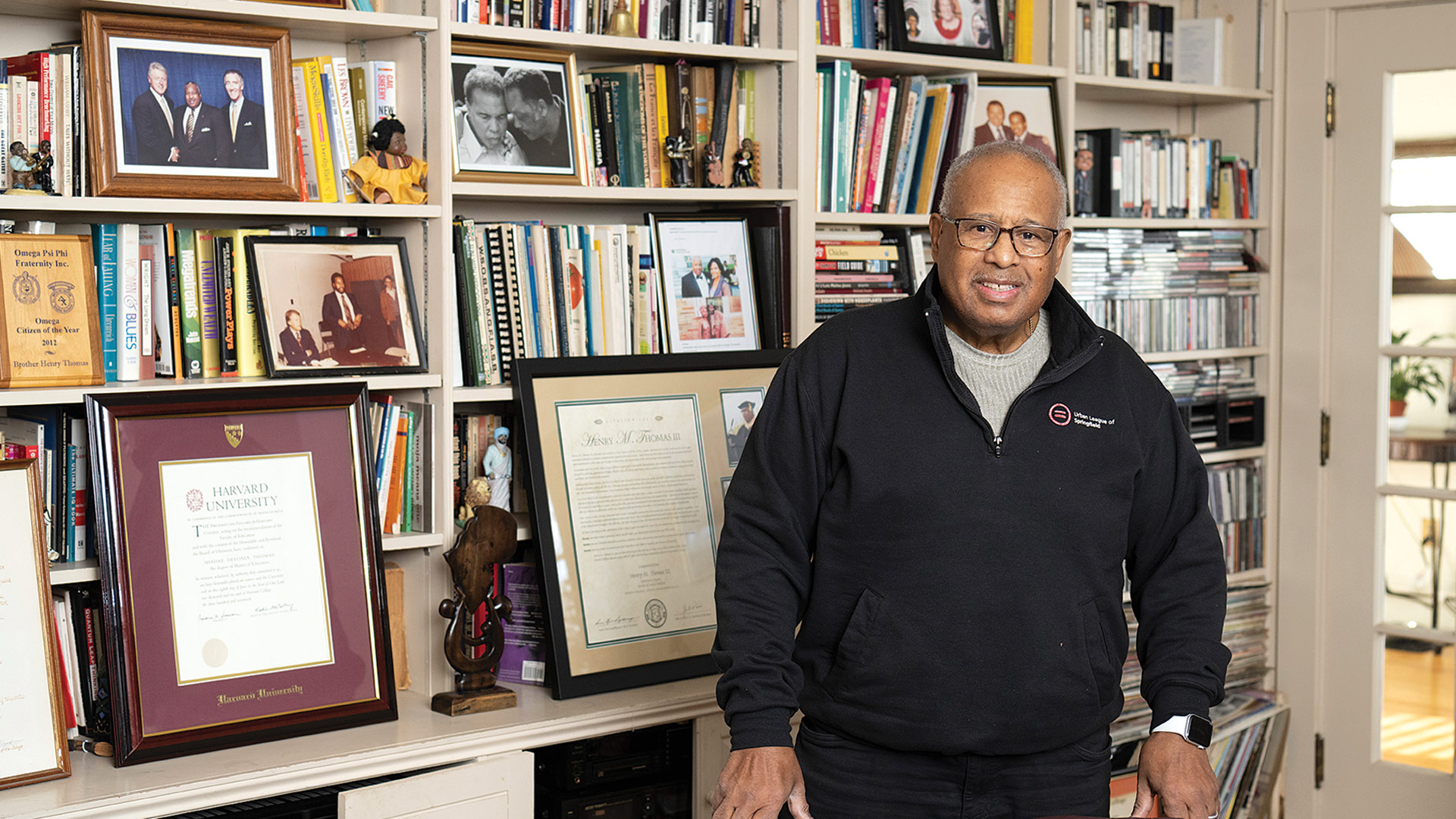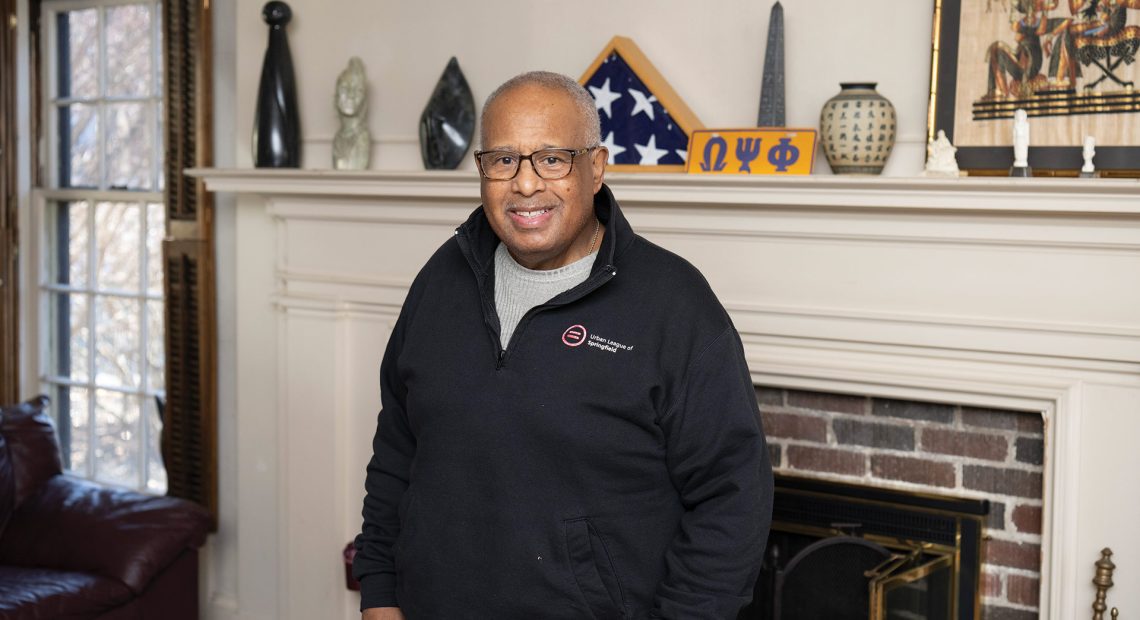His Life Story Is One of Creating Opportunities for Others

Leah Martin Photography
“This is my life story.”
That’s what Henry Thomas said as he gestured to a piece of furniture in his living room — an end table with a compartment under its glass top that contains dozens of items that, indeed, trace many points along his life’s journey.
It’s a story told by business cards and nametags. Badges from his days as Springfield’s Fire and Police commissioner. A ticket to President Obama’s first inauguration in 2009. A campaign button from Mike Dukakis’ unsuccessful presidential run in 1988, which Thomas worked on. His Ubora Award from Springfield Museums, along with various other medals and ribbons. A baby-dedication program for one of his five grandchildren. A miniature saxophone, representative of the music he would like to pursue more fully when he has more time.
And two objects that are oddly related. One is a 1950s-era box from a product called Asthmador, a powder that was burned and inhaled in the days before aerosol asthma inhalers. “It looked like I was doing hash,” he laughed. The other object is his draft card for military service during the Vietnam War.
“I got a waiver when I was in college, so that saved me from having to go right away,” he recalled. But when it came time to visit the draft board, “they said, ‘sorry, we can’t take you.’ I said, ‘why not?’ They said, ‘you’ve got asthma.’”
“If you’re trying to get into the end zone for a touchdown, you can’t run out at the five-yard line, back to the coach, and say, ‘hey, Coach, I’m trying to get in the end zone, but this guy keeps stopping me.’ There’s always going to be a defense in life, and that’s what I’ve preached to my kids as well.”
Coming from a long line of men who had seen military service, from the Civil War through two world wars, Thomas felt … well, disappointed. And he argued about it, but was told that an asthma attack could get not just him killed, but other soldiers as well.
“That’s what saved me from going. But I shouldn’t say ‘saved me,’ because I do consider it an honor to serve your country,” he said.
After excelling in football, track, and gymnastics in his youth — he’s a member of the Springfield High School Sports Hall of Fame — he also aspired to play football professionally, but a severe ankle injury derailed that goal as well. But he took lessons from those days that have served him well all his life.
“In a sport like football, all the principles of life are embedded — I think you can say that about other sports as well, but I’m more familiar with football,” said Thomas, who was a running back at Technical High School and American International College. “If you’re trying to get into the end zone for a touchdown, you can’t run out at the five-yard line, back to the coach, and say, ‘hey, Coach, I’m trying to get in the end zone, but this guy keeps stopping me.’

This table contains many of the meaningful items that tell Henry Thomas’s life story.
“There’s always going to be a defense in life, and that’s what I’ve preached to my kids as well,” he went on. “A lot of guys were bigger and better than I was. But I had a lot of willpower, and I think that was the difference sometimes.”
So, thanks to his asthma and his ankle, Thomas chose a different course after his graduation from AIC in 1971: he got to work on his master’s degree; married Dee, his wife of 51 years; and went to work for the Urban League.
Fifty-two years later, he’s still there, with almost a half-century at the helm. It’s a life marked by profound changes in society, with myriad opportunities to make a deep impact throughout this region. It’s the life of a Difference Maker.
Early Impact
Thomas’ first role at the Urban League was youth coordinator, and he immediately saw the impact the organization could have on youth, as well as older people.
“The late Vernon Jordan told me, ‘Henry, this is the best job in black America, because you have an opportunity to meet a host of interesting folks, and you become more sensitized to the challenges and issues that impact the lives of the people you know, or even in your family.’”
In 1974, at age 25, Thomas became the nation’s youngest leader of a national Urban League affiliate. One of his key areas of focus throughout his career has been education, and not just through Urban League programs; he also served for 13 years on the UMass Amherst board of trustees — including two and a half years as board chair — and was a co-founder of New Leadership Charter School.
In all Urban League initiatives — its programs include education and youth-development initiatives, as well as programs for economic and workforce development, health and wellness, and seniors — Thomas has been driven by an understanding of the importance of equity.
“No equity, no excellence,” he simply said. “I always had a feeling that things could be better, as it relates to equity, everyone getting the treatment that others are getting.”

From co-founding a charter school to chairing the UMass Amherst board of trustees, Henry Thomas has made education central to his work throughout the decades.
Leah Martin Photography
Even today, programs like Youth STEM Enrichment, Digital Connectors, a partnership with UMass Amherst IT, and access to STEM programs at Springfield College speak to the need to break barriers to technology adoption by urban teens.
“Technology has had an impact on the Urban League, as it has with many other business,” Thomas said. “Technology is a real game changer in how well are you going to adapt to doing a new job — or an old job, because even the old job has to get upgraded. It’s major, because I’ve seen so many people working inefficiently, and that can limit you. If you want to climb, you’ve got to learn how to do these things.”
Thomas’ leadership and advocacy on the UMass board of trustees was instrumental in UMass Chan Medical School’s establishing its first-ever regional campus, UMass Chan Medical School – Baystate, in downtown Springfield, and its focus on improving the health and well-being of the region’s medically underserved rural and urban communities.
For that effort, he recently earned an honorary doctorate there, to go along with similar honors from UMass Amherst, Bay Path University, Westfield State University, and Nichols College. In addition to his bachelor’s and master’s degrees from AIC, he also earned a juris doctor degree from Western New England University School of Law.
Also in the vein of education and workforce development, Thomas established Step Up Springfield, a teacher-development program in Springfield; is funding (along with his wife, Dee, a former teacher and principal herself) a $50,000 scholarship for Black youth from Springfield; and tackled a two-year assignment with the National Urban League as its vice president for Youth Development, with a primary focus of youth development within inner-city communities.
Another one of Thomas’ successes was bringing Camp Atwater in North Brookfield — the oldest overnight camp for Black youth in the U.S. — back to life in 1980 after a period of dormancy. The camp, which celebrated its 100th anniversary in 2021, is especially meaningful to him because he attended as a youth.
“I don’t feel desperate. I feel like we can get to where we need to be. I’m optimistic.”
“It had an impact on me; this was the place where I learned that I don’t have to make a selection between being cool or being smart. I found out that I could do both.”
The lesson he took from his own experience at camp was that kids need to see other kids making the right choices in life.
“These kids knew all the contemporary dances. But they were talking about becoming a doctor, becoming a lawyer, and at the same time shooting three-point shots. And I said, ‘wow, I really don’t have to make a choice. I could do both.’”
But it’s not just showing teens positive pathways, but helping them get on them, that really matters, he added. He said his parents did that for him, and it’s been his life’s work at the Urban League to help others achieve their dreams.
“Like I said before, it’s equity. If you don’t have a chance to be as good as the next woman or guy, then you’re not going to achieve the excellence that you think you’re capable of. So I should give my parents a little credit.”
A Very Good Life
When considering his long list of achievements of impact, Thomas boils it down simply.
“It’s been a very good life,” he said, before expressing pride in his wife and his children; his son works for OppenheimerFunds in South Orange, N.J., and his daughter is an assistant school superintendent in Richmond, Va. And, as noted, Thomas’ own responsibilities have taken him beyond the Urban League, such as his role as first African-American to chair the Springfield Police and Fire commissions.
“I’ve actually marveled at all the various hats this man has worn through the years, particularly as Police commissioner,” Dee Thomas said. “Those were really rough times when he was in that position, and he met a lot of opposition in trying to change the face of the police force and make it more diverse. I will never forget those days. But I’ve seen all the people that he’s touched, and we still see officers come up and thank him for allowing them to be on the commission, because they know, if were not for him, they wouldn’t be there.”
It’s just another example, Henry said, of sometimes having to run the ball through a defense in life.
And he’s hopeful that the younger generation will continue to pick up his mantle, understanding that equity has not yet been achieved in all areas of life, no matter how much various corners of society — in government, education, and elsewhere — would like the conversation to go away, as evidence by the current tussles over critical race theory and what students are allowed to learn and read.
“I think it is doing an injustice to young people when they are not getting the kind of access that they need — and that they deserve — to help them understand the world and how it operates: the good, the bad, and the ugly. You can make better choices when you know all three,” he said. “I do think that there’s too much of a passive approach by people who are self-sufficient and feel, well, ‘that’s not my problem. I hate to see it, but I’ve got to move on.’”
Thomas is not moving on from those goals, even after his time with the Urban League is done. He’s seen enough to recognize the power of arming young people with education, creating access to opportunities, and continuing the conversation.
“But I don’t feel desperate,” he said — largely because of those young people with the potential to be difference makers themselves, as he certainly is. “I feel like we can get to where we need to be. I’m optimistic.”
That’s a life story — and a continuing legacy — much bigger than a glass-covered end table.






